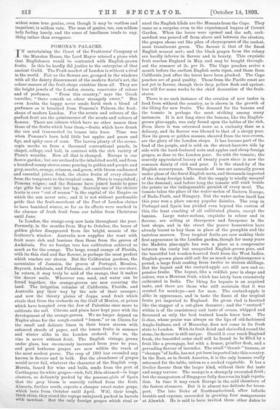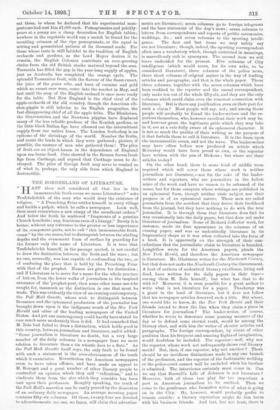POMONA'S PALACES.
IN entertaining the Court of the Fruiterers' Company at the Mansion House, the Lord Mayor uttered a pious wish that Englishmen would be contented with English-grown fruits. In this he hardly did justice to the enterprise of that ancient Guild. The Fruit-market of London is without a rival in the world. Fair as the flowers are, grouped in the windows with all the dainty discernment of the modern florist's art, the colour-masses of the fruit-shops outshine them all, They are the bright jewels of the Landon streets, reservoirs of colour and of perfumes. " From this country," says the Greek traveller, " there cometh an odour strangely sweet." But .even Arabia the happy never sends forth such a blend of perfumes as is breathed from Pomona's Palaces, the fruit- shops of modern London. For the scents and colours of the perfect fruit are the quintessence of the scents and colours of flowers. There are colours which have no other names than those of the fruits which bear them,—fruits which have drunk the sun and transmuted its beams into hues. Time was when Pomona's horn held little but apples and pears and figs, and spiky ears of corn. The barren plenty of the cornu- copia mocks us from a thousand conventional panels, in chapel, college, and hall, in contrast with the rich variety of Flora's wreaths. Now all that is changed. Europe is our flower-garden; but our orchard is the inhabited world, and from a hundred sunny shores come pouring in golden and purple and grey, scarlet, orange, crimson, and green, with bloom undimmed and essential juices fresh, the choice fruits of every climate from the temperate to the tropical zones. Flora is vanquished ; Pomona reigns ; and the Seasons have joined hands to pour ripe gifts for ever into her lap. Scarcely one of the choicer fruits is ever "out of season" in the capital of the Empire on which the sun never sets ; and it is not without pardonable pride that the fruit-merchant of the Port of London claims to have banished winter, so far as its effects were marked in the absence of fresh fruit from our tables from Christmas until June.
In London, the orange-crop now lasts throughout the year. Formerly, in the months from May to October, the boxes of golden globes disappeared from the bright, mosaic of the fruiterer's window. Australia now supplies the want with fruit more rich and luscious than those from the groves of Andalusia. For no foreign tree has cultivation achieved so much as for the orange. The large, round orange of Florida, with its thin rind and fine flavour, is perhaps the most perfect which reaches our shores. But the Californian gardens, the mountains of Jamaica, the groves of Portugal, Messina, Beyrout, Andalusia, and Palestine, all contribute to our store. In return, it may truly be said of the orange, that it makes the desert smile. Wherever sun, sand, and water can be found together, the orange-groves are now covering the land. The irrigation colonies of _California, Florida, and Australia pay their way by the sale of their oranges ; and now the thirsty plains of Joppa send fruit which rivals that from the orchards on the Gulf of Mexico, at prices which have tempted even the Jew of Palestine once more to cultivate the soil. Citrons and pines have kept pace with the development of the orange-groves. We no longer depend on Naples alone for the rough-coated " lemon," or on Cintra for the small and delicate limes in their boxes strewn with coloured shreds of paper, and the lemon fruits in summer and winter alike in the London orchard. For us, the vine is never without fruit. The English vintage, grown under glass, has enormously increased from year to year, and good hothouse grapes are now within the reach of the most modest purse. The crop of 1893 has exceeded any known in flavour and in bulk. But the abundance of grapes would never fail, whatever the character of the English crop. Murcia, famed for wine and bulls, sends from the port of Carthagena its white grapes—rich, full, thin-skinned—in huge clusters, so delicately packed by the peasant-girls of Spain that the grey bloom is scarcely rubbed from the fruit. Almeria, further south, exports a cheaper sweet-water grape, which lasts from October until April. Wit!, their tough, thick skins, they stand the voyage uninjured, packed in barrels with sawdust. But the only foreign grapes which rival or excel the English kinds are the Muscats from the Cape. They came as a surprise even to the experienced buyers of Covent Garden. When the boxes were opened and the soft, cork- sawdust was poured off from above and between the clusters, the grapes shone out like piles of chrysoprases of the coolest, most translucent green. The flavour is that of the finest English muscat sort; and the black grapes from the colony are hardly inferior in flavour and in beauty. This exquisite fruit reaches England in May, and may be bought through- out the summer at 2s. per lb. The Cape peaches arrive a month before the earliest English sorts ripen, and those from California just after the latest have been plucked. The Cape peaches are of good quality. Those from the Pacific coast are not yet in favour, though their deep yellow flesh and apricot- hue will for some weeks be the chief decoration of the fruit- stores.
There is no such instance of the creation of new tastes in food from without the country, as is shown in the growth of the liking for new fruits. The demand for the banana and the tomato is perhaps the most striking among many instances. It is not long since the banana, like the English- grown pine-apple, was only found upon the tables of the rich. Even there it was esteemed more as a curiosity than as a delicacy, and its flavour was likened to that of a sleepy pear. Now its green or golden masses, sheared from the tree-crown, are the glory of the London shops. It has become part of the food of the people, and is sold on the street-barrows side by side with the hard-featured nuts and apples and cheap foreign grapes, so dear to the London poor. So with the tomato; the scarcely appreciated luxury of twenty years since is now the common dainty of rich and poor. It is the stand-by of the English nurseryman. Thousands of tons are annually grown under glass of the finest English sorts, and thousands imported of the cheap foreign kinds. But the supply is wholly unequal to the demand ; and before long the tomato will rank beside the potato as the indispensable garnish of every meal. The tomato takes the place of the water-melon of Eastern Europe, of Buda-Pesth, and Hungary. But the water-melon itself has this year won a place among popular dainties. The crop in Portugal and Spain has yielded even beyond the custom of this, the least exacting of all cultivated plants, except the banana. Large water-melons, exquisite in colour and in flavour, are selling at threepence and fourpence in the best shops, and in the street the poorer housewives have already learnt to buy them in place of the pumpkin and the tasteless marrow. True tropical fruits are now making their first appearance in the London garden, though for many years the Madeira pine-apple has won a place as a compromise between the costly but unequalled English-grown pine, and the beautiful but wooden-hearted fruit from the West Indies. English-grown pines still sell for as much as eighteenpence pound, a large fruit costing from twelve to sixteen shillings. But the loquat and the custard-apple are still new and ex- pensive fruits. The loquat, like a reddish pear in shape and colour, was a Mexican fruit, which has lately been extensively cultivated in India. The liking for loquats is an acquired taste, and there are those who still maintain that it was created for monkeys—not for men. The custard-apple is alike in appearance, and in taste the finest of the tropical fruits yet imported to England. Its green rind is facetted like the stopper of a cut-glass decanter ; and the " custard " within is of the consistency and taste of cream, whipped and flavoured as only the best trained hands know how. The li-dhce, whose praise was always on the lips of old-fashioned Anglo-Indians, and of Macaulay, does not come in its fresh state to London. With its fruit dried and shrivelled round the stone, its flavour is still unique. Should it ever reach England fresh, the beautiful outer shell will be found to be filled by a fruit like a greengage, but with a firmer, gristlier flesh, and a pervading flavour of lavender. The small " thumb " banana, or " chumpa " of India, has not yet been imported into this country. In the East, as in South America, it is the only banana really esteemed for the table, unless as a cooked vegetable. It has a livelier flavour than the larger kind, without their flat taste and soapy texture. The mango is a strangely overrated fruit; but the mangosteen of Singapore fully deserves its high reputa- tion. In time it may reach Europe in the cold chambers of the fastest steamers. But it is almost too delicate for trans- port. The late Duke of Northumberland, after infinite trouble and expense, succeeded in growing four mangosteens at Alnwick. He is said to have invited three other dukes to eat them, to whom he declared that his experimental man- gosteens had cost him £1,000 each. Pomegranates and prickly- pears at a penny are a cheap decoration for English tables; nowhere in. the vegetable world can a match be found for the mantling crimson of the ripe pomegranate, or the equal in setting and geometrical pattern of its thousand seeds. For those whose taste is still faithful to the tradition of English orchards and gardens, as the Lord Mayor desires it to remain, the English Colonies contribute an ever-growing choice from the old British stocks matured beyond the seas. Tasmania has filled the gap in the year-long supply of apples, just as Australia has completed the orange cycle. The splendid Tasmanian fruit, with the flavour of the finest russet, the juice of the roma vitae, and hues of carmine and gold which no russet ever wore, come into the market in May, and last until the crop of the English orchard is once more ready for the table. But New England is the chief rival of the apple-orchards of the old country, though the American rib- eton-pippin is still inferior to its English progenitor, the fast-disappearing chief of all the apple tribe. The Blenheims, the Gravensteins, and the Newtown pippins have displaced many of the less reliable produce of the Kentish gardens, as the little black Italian figs have elbowed out the intermittent supply from our native trees. The London fruit-shop is an epitome of the shrinkage of the world. Number the fruits, and count the lands in which they were gathered ; picture, if possible, the manner of men who gathered them I The piles of fruit are an abject-lesson in the dependence of England upon sea-borne food. Cato showed in the Roman forum fresh figs from Carthage, and argued that Carthage must be de- stroyed. The piles of foreign fruit may serve to remind us of what is, perhaps, the only side from which England is destructible.



















































 Previous page
Previous page